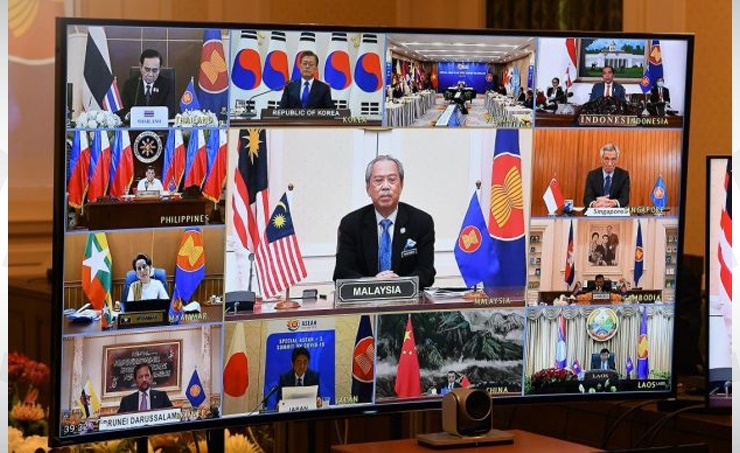Malaysia's Prime Minister shares with ASEAN his country's experience in fighting COVID-19
Malaysia has put in place several key strategies to address critical health, economic and social issues brought about by the COVID-19 pandemic, including the imposition of the Movement Control Order (MCO), the country's prime minister has said.
Under the MCO, non-essential government and private sector services were ordered closed, mass movements and gatherings prohibited, and strong advice given for Malaysians to stay at home.
“Malaysia has also mandated all of its citizens returning from abroad to undergo compulsory quarantine for two weeks," Prime Minister Muhyiddin Yassin said as he shared the country's experiences and knowledge in facing the COVID-19 pandemic with ASEAN member states during a Special ASEAN Summit on COVID-19 conducted via video-teleconferencing.
“As a stricter measure, we have also enforced Enhanced MCOs (EMCOs) in areas with a high infection rate. These EMCO areas are completely closed with no entry and exit for residents and visitors, and every individual in the area will be screened and treated if infected,” Muhyiddin said, quoted by national news agency Bernama.
Malaysia has been aggressively increasing its capacities to conduct more tests per million capita, rigorous contact tracing, and treatment to all patients regardless of their level of symptoms and illnesses, he added.
“I understand, that more tests may result in higher reported infections but this is needed to ensure we swiftly detect and treat those infected,” he said, adding that Malaysia’s mortality rate as of Monday stood at 1.6 per cent as compared to the global average of 6.1 per cent."
Muhyiddin said the government had provided much-needed support to the Health Ministry to increase its screening capacity, further intensify treatment for those infected, adding that the financial boost to the ministry would help in obtaining more test kits, ventilators and personal protective equipment.
“On behalf of Malaysia, I would also like to thank our friends in ASEAN who have contributed test kits and medical equipment in our time of need. In times like this, we truly appreciate how valuable all the assistance and support rendered by our ASEAN friends and this is what makes us different than other regional groups around the world,” he said.
Meanwhile, the prime minister said Malaysia had also announced three stimulus packages worth $64.6 billion to cushion the impact of COVID-19 on the people and businesses.
He said those stimulus packages had a face value of 18.1 per cent of its Gross Domestic Product (GDP) that includes loan repayment deferments, wage subsidies, cash handouts and free internet for Malaysians for the next few months.
“However, these strategies will only assist Malaysia in getting through this period of fighting COVID-19. There needs to be a regional post-pandemic recovery plan and Malaysia cannot do this alone,” he added.
Muhyiddin said in every crisis lies an opportunity and Malaysia foresees that ASEAN as a regional block has to work together post COVID-19 to ensure no one is left behind.
Earlier in his opening remarks, the prime minister said a coherent, multi-sectoral, multi-stakeholder, whole-of-ASEAN approach was critical in ensuring a timely and effective response to the pandemic, Bernama reported.
“This is a war against an invisible enemy and the aftermath will result in a new global landscape. The world will never be the same again and we in ASEAN must acclimatise ourselves with what is going to be the new global order, simply put – the new normal," he said.
“Malaysia is deeply concerned with the rising number of COVID-19 cases in our region as ASEAN has witnessed a rapid escalation of infections in the past few weeks. Globally, the situation is just as bad, if not worse. I am confident that with solidarity, vision and leadership we can unite and get through these dark times together. As a region, we have faced multiple crises before this and I believe, we will once again overcome this and emerge stronger than ever. God willing."
Related Posts

